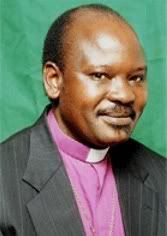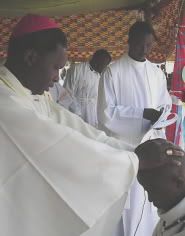

Left: Anglican Bishop Joseph Wasonga of Maseno West in Kenya.
After reading about two controversies over an unauthorized concelebration between Anglican and Roman Catholic priests (one in a priory in Ireland and another more recently in Arizona), it got me thinking about the mutual recognition of orders and that led me to recall the old effort to resolve the problem through the "Dutch touch" and that led me to remember a conversation I once had about . . . the "Kenyan touch."
For those unfamiliar with the problem, while Anglicans recognize the validity of Roman Catholic ordinations, the reverse is not the case (at least officially). The 1896 papal bull Apostolicae Curae clarified that the Vatican considers Anglican orders to be "absolutely null and utterly void" because of a defect of form and intention in the Prayer Book ordinal which broke the chain of apostolic succession after the Reformation period. Thus, Roman Catholics may not receive Holy Communion in Anglican churches and Roman priests are not permitted to invite Anglican priests to join in the consecration of the Eucharist (of course, they would neither be at liberty to invite another cleric whose orders are considered valid but who are not in full communion with Rome).
On to the "Dutch touch." When the ecumenical movement was gathering steam in the early 1900s, an attempt was made to remedy this obstacle to corporate reunion with Rome. Since Rome acknowledged the validity orders in Old Catholic churches of the Union of Utrecht (with whom the Anglicans had recently entered into a relationship of full intercommunion), an effort would be made to gradually and intentionally make sure that the stream of succession from the Dutch was merged with the English.
At each ordination, the protocol was documented, with the Church of Utrecht bishop stating that he was participating in order to pass along the Dutch line of succession, and another ducument from the new Anglican bishop stating that in episcopal consecrations he performed, it was his intention to convey the Dutch succession. Fr John Hunwicke noted, "Both of these documents constitute a tacit reference to Apostolicae Curae and imply a willingness to address that Bull as a significant reality in ecclesial life. In a sense, they say 'We care about Pope Leo's condemnation of our Orders; and we are remedying the alleged defect in ways that (we hope) will be acceptable in his terms'." His full article on the subject may be found here (see the appendix for the texts of the documents in question).
Canon J. A. Douglas described the significance of the practice by noting, "The fact that [Bishop Simpson] had the intention to pass on the Old Catholic stream of Episcopal Succession might be of no small importance in given future conditions . . . if ultimately the stream of the Old Catholic succession is completely merged with the Anglican . . . the most severe Roman Catholic will find it hard to question the validity of Anglican Orders."
Of course, with the advent of the ordination of women and other serious Anglican departures from traditional faith and practice, the point of combining successions became moot. Canterbury and Rome were now moving apart, not together. Yet if full communion is to ever be established, the Roman doubt about our orders will need to be remedied to Rome's satisfaction--either through massive reordinations at that time, or by participating in ordinations in advance.
Which leads me to the "Kenyan touch." Back in the Spring of 2000, I was a Junior seminarian at Nashotah House. Every Wednesday was work crew in the afternoon. I was assigned to the library, along with fellow seminarians Jefferson Otwell and Joseph Wasonga (a Kenyan bishop on sabbatical at the time). One Wednesday afternoon when we had finished our chores, the three of us were standing around the bookcases talking. The subject turned to Africa and the life of the church there. We asked all kinds of questions. What are the churches like? What challenges do your parishes face? What are ecumenical relations like?
Bishop Wasonga said ecumenical relations are very good. "We get along with the Catholic bishops very well. They always come when we consecrate a new bishop." Something made me pause and ask for clarification. "Your Grace, do you mean they attend as ecumenical guests?" He replied, "Oh, no. They consecrate the bishop with us."
Jefferson and I looked at each other with faces of disbelief. Maybe the bishop's English wasn't so good (although it had always been better than my English). I questioned him again, "Do you mean that the Roman Catholic bishops attend in choir and are present for the consecrations, or that they are among the consecrating bishops?" He answered, "They consecrate the new bishop too." Still disbelieving I went on, saying, "Your Grace, do you mean they wear mitres and lay their own hands on the new bishop's head and say all the words they are supposed to say in the ordination rite?"
"Yes, yes!" Wasonga replied.
It is still hard for me to believe. Perhaps things are different out on the mission front. This is the only Anglican bishop in Kenya I've had the priviledge of speaking with about this. If anyone else has further details to add (to disprove or to corroborate), please comment.


No comments:
Post a Comment